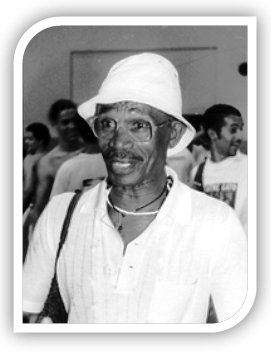Mestre Paulo dos Anjos
‘José Paulo dos Anjos’
August 15, 1936 – March 26, 1999
Few of today’s Capoeira practitioners stick so close to the art’s traditions and originality as José Paulo dos Anjos.
Mestre Paulo dos Anjos was known as one of the most skilled and versatile Angoleiros of the century. He strongly resisted the attempts to incorporate the changes and fads of modern Capoeira into the traditional art. “For me, nothing has changed. I continue practicing Capoeira Angola according to tradition,” he used to say.
Mestre Paulo was born on August 15th, 1936 in the town of Instance in Sergipe. He moved to Bahia and started work young as a result of the early death of his father. Being the eldest of his brothers, he assumed the responsibility of helping to raise them with his mother. At 14 years old, Mestre Paulo made a name for himself in Salvador as a promising boxer. Later he met Master Canjiquinha, who introduced him to Capoeira. The young Paulo began to frequent the rodas of the Bahian cities, including the rodas of Mestre Pastinha’s academy. In street festivals, his technique and abilities began to attract everyone’s attention. From then on, time would transform him into a master, graduated by Mestre Canjiquinha himself. He also spent time with Mestre Gato Preto, teaching with him in Bahia and also in São Paulo.
With his own style of singing the Capoeira Angola songs, Mestre Paulo dos Anjos was venerated by all. He seemed to have an “orchestra” in his throat. He became widely respected in the Capoeira world and recorded some songs on a CD combining his unique style with the musical tradition of Capoeira. Alongside Mestre Gato Preto, he gave classes on Itaparica Island as well as other places in the metropolitan region of Salvador. His unique way of playing Capoeira helped keep alive the wit of his master and was enjoyed by all other masters alike.
In the 1970s, preoccupied with the direction of Capoeira Angola, Mestre Paulo dos Anjos decided to go to Sao Paulo in order to transmit the teachings of his master. He moved there for five years and in São José dos Campos, he formed the group Anjos de Angola (Angels of Angola). In 1978 he won the Capoeira championship at the Pacaembu Gymnasium in the state capital. However, Mestre Paulo found that he was very little understood in Sao Paulo, making it difficult to keep alive the Capoeira Angola tradition.
Thus, he returned to Salvador in 1980 and influenced the movement of capoeiristas fighting for better working conditions. Upon his return, he also gathered his followers and told them of the wise decision that from now on he would work with underprivileged children, using Capoeira as a vehicle against ignorance and indifference. Indeed, Mestre Paulo was among the first to believe that through Capoeira, it would be possible to train people to learn critical and creative thinking, interacting positively with the world in which they live.
In 1987, he led the Brazilian Capoeira Angola Association and combined his Capoeira work with his activities as a civil servant in Salvador’s town hall. Many of his students have now become Masters and Professors with their own academies around the world. Past students are Virgílio do Retiro, Jaime de Mar Grande, Jorge Satélite, Pássaro Preto, Amâncio, Neguinho, Renê, Alfredo, Djalma, Galego, Mala, Josias, Cabeção, Jequié, Feijão, Vital, and Al Capone, among others.
Homenagem ao Mestre Paulo dos Anjos
Mestre Paulo dos Anjos passed away on March 26, 1999 in Salvador, the victim of an infection contracted after a surgery in a local hospital. His death represents the loss of not only a very distinguished human being, but also an irreparable loss for Capoeira, especially the lineage of Capoeira Angola.
Mestre Val Boa Morte
Assisted By Elisa Osegueda ‘Passarinha’


You must be logged in to post a comment.